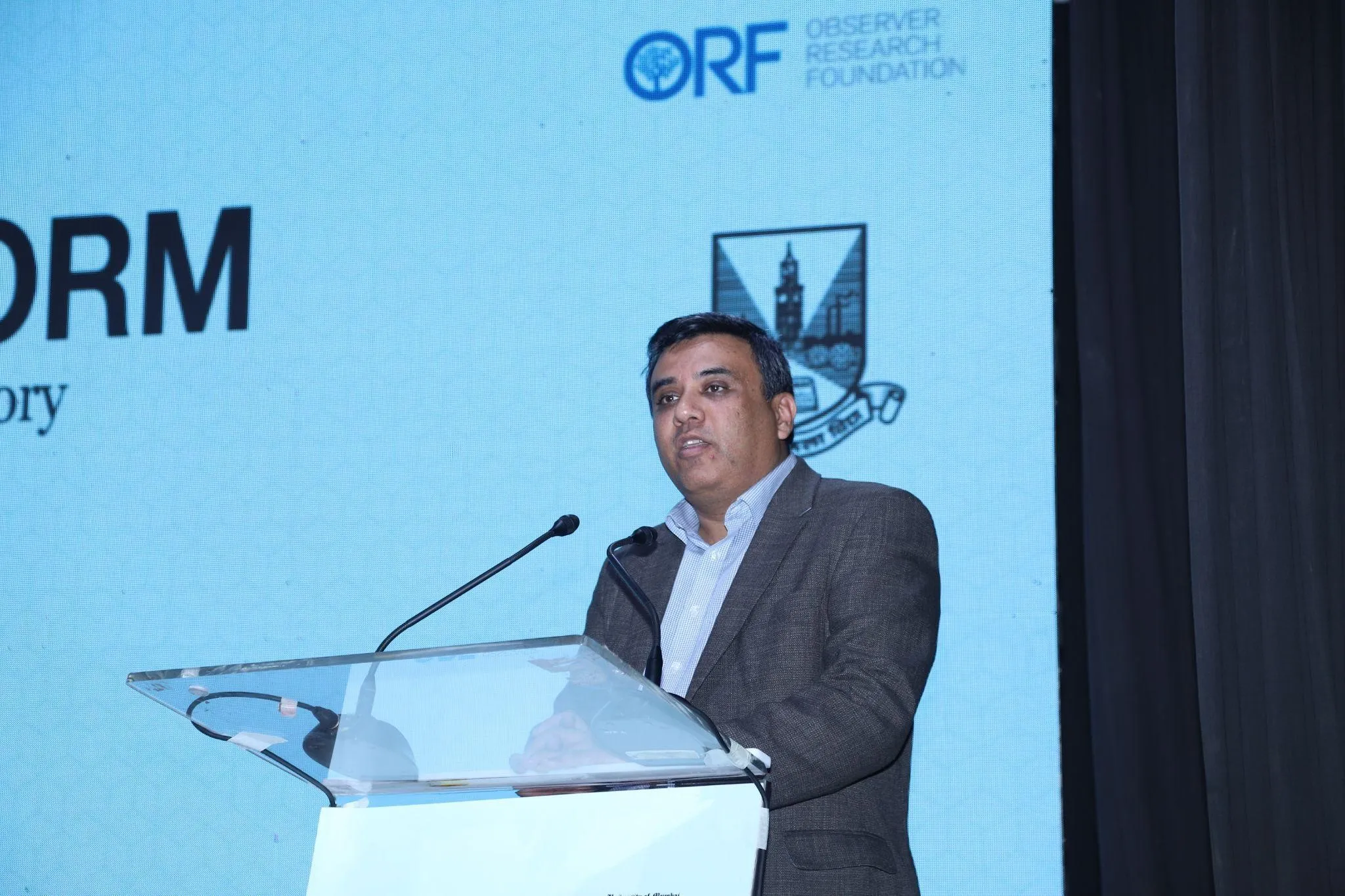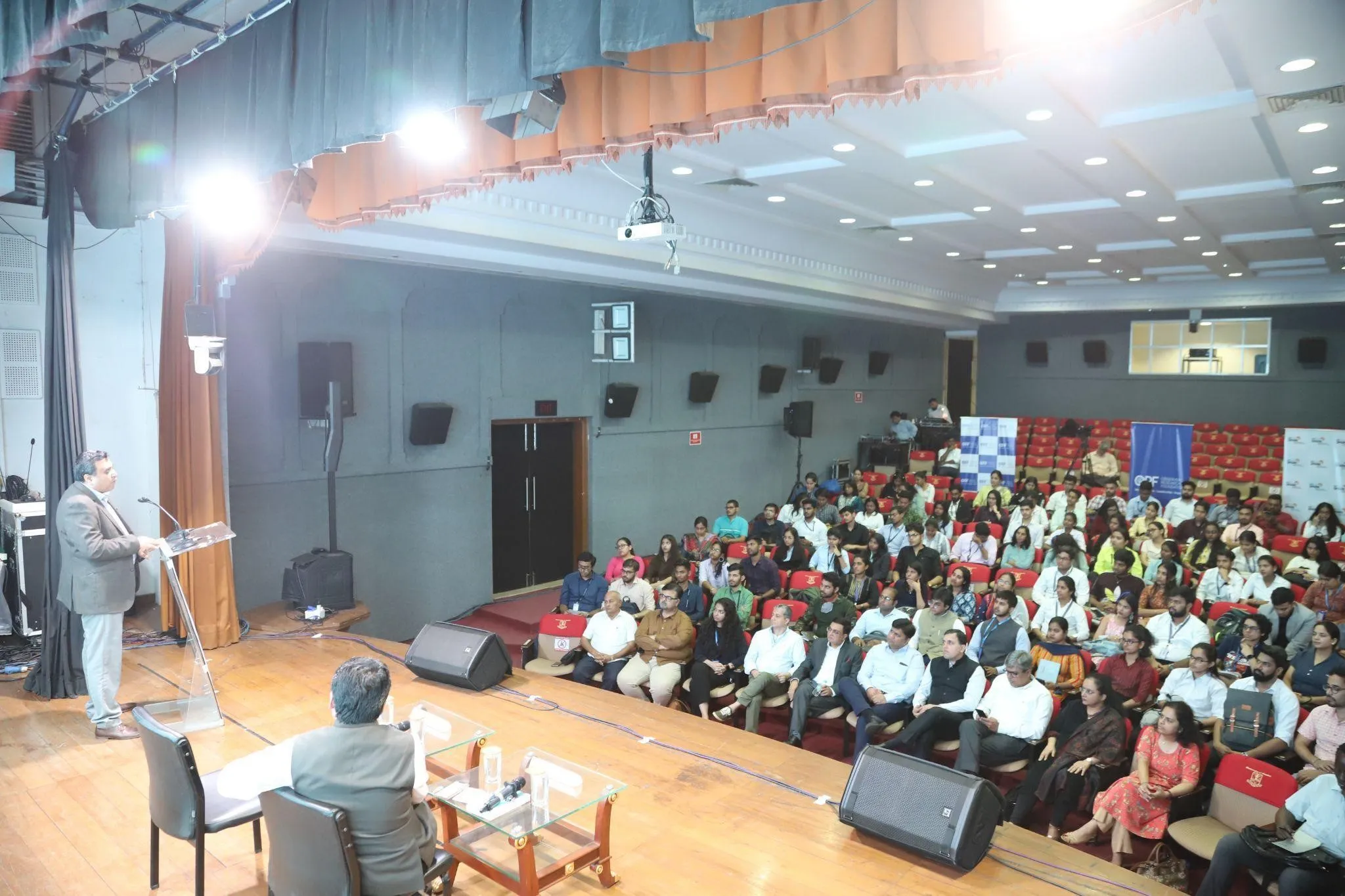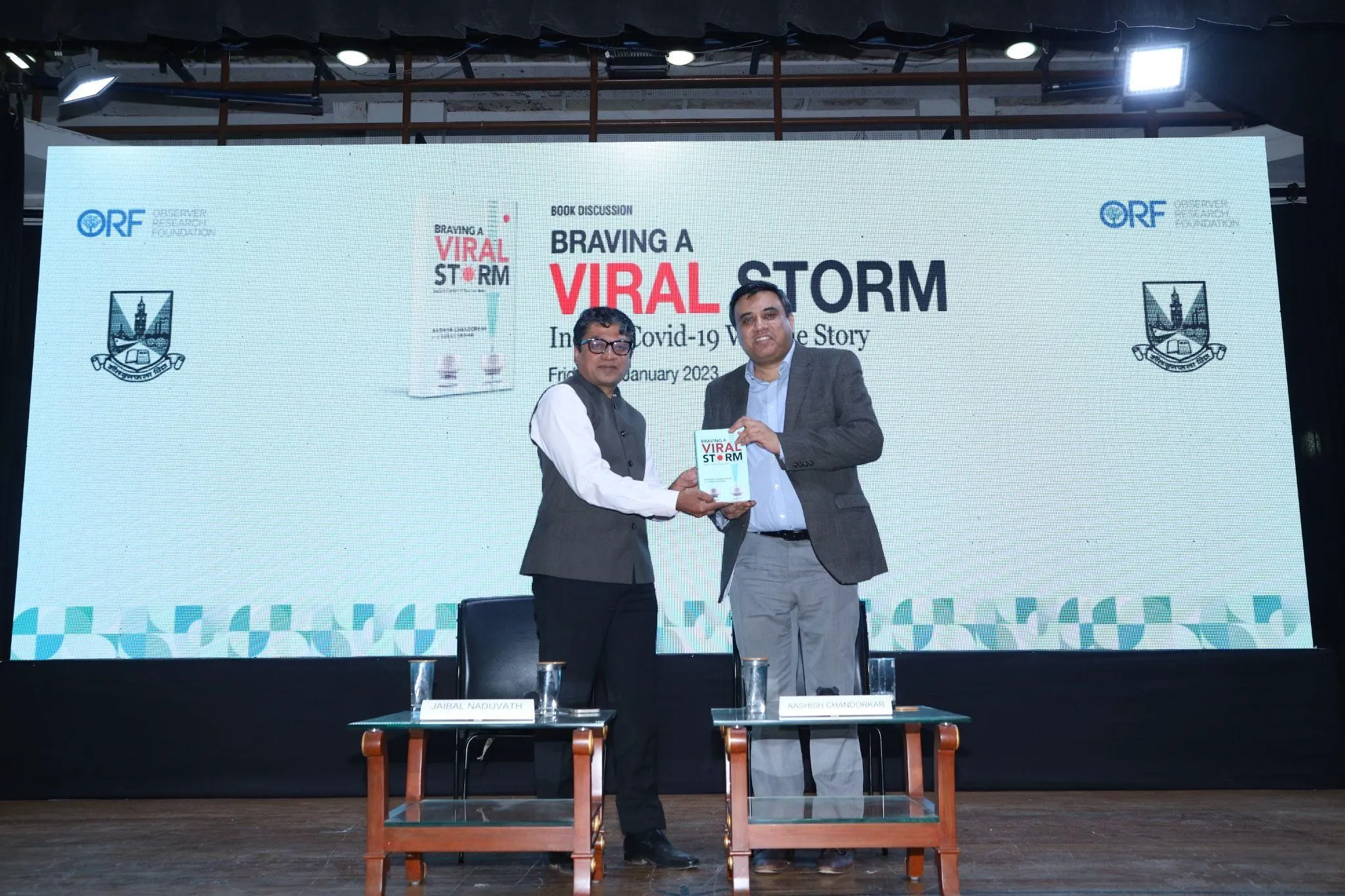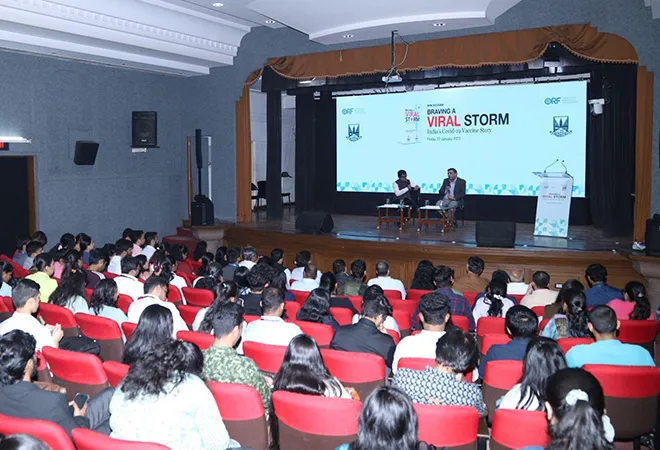India reached a milestone of 200 crore vaccines in July 2022, only 547 days after the immunisation drive had begun.
Braving a Viral Storm: India's Covid-19 Vaccine Story, authored by Ashish Chandorkar and Suraj Sudhir, chronicles the story of India's determined and exemplary response to the COVID-19 pandemic and the efforts to vaccinate its population over the last three years.
On 27 December 2023, the Observer Research Foundation (ORF), in association with the University of Mumbai, hosted a book discussion with the co-author Aashish Chandorkar. Representatives from different arenas and students from St. Xavier’s, University of Mumbai, Kohinoor Business School, Kohinoor Management School, Sterling institute of Pharmacy, and HSNC University attended the discussion. Chandorkar was in discussion with Jaibal Naduvath, Vice President, ORF Mumbai.

Chandorkar expressed that his inspiration for writing the book was the advent of the pandemic itself. He and his co-author tracked the series of events for three years since the onset of the pandemic in India. They traced its socio-economic impact and the measures undertaken to stem the spread of the virus. He affirmed that New Delhi handled this challenge very well and that it should be a celebratory success story.
Chandorkar shared a few more insights from the book, including elaborating on the three A’s: Access, availability, and affordability. He continued that with limited resources to vaccinate the national and global population, New Delhi’s programme first made it permissible to all but prioritised certain age groups and ensured it was cost-friendly. He highlighted that India was the first country to sign a public-private partnership. He further added that ICMR worked with Bharat Biotech in early May 2020 ahead of announcements by the United States and the United Kingdom. India also made huge investments in production and research. It produced the most vaccines in the world, including Covaxin, Covishield, and Novavax and manufactured on a contract basis for Sputnik and Corbevax.
After having assured the number of vaccines, Chandorkar said that the next step for the government was to deliver them to the population. India developed the ‘Co-Win’ platform, conceptualised as early as May 2020, and ensured the delivery process was transparent, creating trust among the citizens. It also saved millions of Indian foreign reserves. Had India imported vaccines from abroad, it would have created a huge fiscal burden on the government. With a well-planned and executed policy of chargeable and non-chargeable vaccines, the implementation of the vaccine drive did not strain the Indian economy.
On the subject of vaccine diplomacy, Chandorkar stated that India also made vaccines an integral part of its foreign policy with the rollout of ‘Vaccine Maitri’, exporting 30 crore vaccines. He further mentioned that India secured intellectual property rights at the World Trade Organization (WTO) for vaccines and got them global recognition.

When asked about scepticism on India's capacity, capability, and ability to respond and renew, Chandarkor admitted the people's hesitation and lack of confidence in indigenous manufacture contrary to the acceptance of foreign concepts and ideas. He gave an example of fiscal responsibility during the pandemic. The West allotted humongous funds to its citizens during this time and is facing inflation today. However, India chose to remain prudent, which received heavy backlash then, but it has helped in a speedy economic revival. This deft handling of the pandemic has challenged the current mindset of 'lower Indian intellectual appeal' compared to the West.

On the question of the government's approach to handling the pandemic, Chandorkar revealed that strategies adopted were discussed in regular meetings by a team of officials from various government departments. Much of it was not known as one only saw the results of the pandemic despite the institutional response in parallel. He later analysed the global scenario stating that the world came together, and a lot of funds were acquired for vaccination research, representing that governance and science collectively can resolve such critical challenges.
Illustrating the experience of Botswana and South Africa, Chandorkar then highlighted the frailty of global institutions. He said that the multilateral institutions need rewiring and have to work for the developing world at large. He also stated that the WTO ministerial and several other meetings were postponed even though the Omicron variant existed before these countries declared its detection. The world suspected the African countries of its diffusion, which hurt their sentiments.
In conclusion, Chandorkar enumerated the lessons learnt from India's pandemic experience. India has established different virology research institutes, such as the National Institute of One Health and the National Institute of Virology to tackle future pandemics and secure a good reserve of vaccines. The collaboration between the government, industries, and societies made the process easy and created a replicable template of governance and decision-making in other areas.
This event report has been compiled by Nutika Kale, Research Intern, ORF and Dhaval Desai, Vice President, ORF.
The views expressed above belong to the author(s). ORF research and analyses now available on Telegram! Click here to access our curated content — blogs, longforms and interviews.

 Chandorkar expressed that his inspiration for writing the book was the advent of the pandemic itself. He and his co-author tracked the series of events for three years since the onset of the pandemic in India. They traced its socio-economic impact and the measures undertaken to stem the spread of the virus. He affirmed that New Delhi handled this challenge very well and that it should be a celebratory success story.
Chandorkar shared a few more insights from the book, including elaborating on the three A’s: Access, availability, and affordability. He continued that with limited resources to vaccinate the national and global population, New Delhi’s programme first made it permissible to all but prioritised certain age groups and ensured it was cost-friendly. He highlighted that India was the first country to sign a public-private partnership. He further added that ICMR worked with Bharat Biotech in early May 2020 ahead of announcements by the United States and the United Kingdom. India also made huge investments in production and research. It produced the most vaccines in the world, including Covaxin, Covishield, and Novavax and manufactured on a contract basis for Sputnik and Corbevax.
After having assured the number of vaccines, Chandorkar said that the next step for the government was to deliver them to the population. India developed the ‘Co-Win’ platform, conceptualised as early as May 2020, and ensured the delivery process was transparent, creating trust among the citizens. It also saved millions of Indian foreign reserves. Had India imported vaccines from abroad, it would have created a huge fiscal burden on the government. With a well-planned and executed policy of chargeable and non-chargeable vaccines, the implementation of the vaccine drive did not strain the Indian economy.
On the subject of vaccine diplomacy, Chandorkar stated that India also made vaccines an integral part of its foreign policy with the rollout of ‘Vaccine Maitri’, exporting 30 crore vaccines. He further mentioned that India secured intellectual property rights at the World Trade Organization (WTO) for vaccines and got them global recognition.
Chandorkar expressed that his inspiration for writing the book was the advent of the pandemic itself. He and his co-author tracked the series of events for three years since the onset of the pandemic in India. They traced its socio-economic impact and the measures undertaken to stem the spread of the virus. He affirmed that New Delhi handled this challenge very well and that it should be a celebratory success story.
Chandorkar shared a few more insights from the book, including elaborating on the three A’s: Access, availability, and affordability. He continued that with limited resources to vaccinate the national and global population, New Delhi’s programme first made it permissible to all but prioritised certain age groups and ensured it was cost-friendly. He highlighted that India was the first country to sign a public-private partnership. He further added that ICMR worked with Bharat Biotech in early May 2020 ahead of announcements by the United States and the United Kingdom. India also made huge investments in production and research. It produced the most vaccines in the world, including Covaxin, Covishield, and Novavax and manufactured on a contract basis for Sputnik and Corbevax.
After having assured the number of vaccines, Chandorkar said that the next step for the government was to deliver them to the population. India developed the ‘Co-Win’ platform, conceptualised as early as May 2020, and ensured the delivery process was transparent, creating trust among the citizens. It also saved millions of Indian foreign reserves. Had India imported vaccines from abroad, it would have created a huge fiscal burden on the government. With a well-planned and executed policy of chargeable and non-chargeable vaccines, the implementation of the vaccine drive did not strain the Indian economy.
On the subject of vaccine diplomacy, Chandorkar stated that India also made vaccines an integral part of its foreign policy with the rollout of ‘Vaccine Maitri’, exporting 30 crore vaccines. He further mentioned that India secured intellectual property rights at the World Trade Organization (WTO) for vaccines and got them global recognition.
 When asked about scepticism on India's capacity, capability, and ability to respond and renew, Chandarkor admitted the people's hesitation and lack of confidence in indigenous manufacture contrary to the acceptance of foreign concepts and ideas. He gave an example of fiscal responsibility during the pandemic. The West allotted humongous funds to its citizens during this time and is facing inflation today. However, India chose to remain prudent, which received heavy backlash then, but it has helped in a speedy economic revival. This deft handling of the pandemic has challenged the current mindset of 'lower Indian intellectual appeal' compared to the West.
When asked about scepticism on India's capacity, capability, and ability to respond and renew, Chandarkor admitted the people's hesitation and lack of confidence in indigenous manufacture contrary to the acceptance of foreign concepts and ideas. He gave an example of fiscal responsibility during the pandemic. The West allotted humongous funds to its citizens during this time and is facing inflation today. However, India chose to remain prudent, which received heavy backlash then, but it has helped in a speedy economic revival. This deft handling of the pandemic has challenged the current mindset of 'lower Indian intellectual appeal' compared to the West.
 On the question of the government's approach to handling the pandemic, Chandorkar revealed that strategies adopted were discussed in regular meetings by a team of officials from various government departments. Much of it was not known as one only saw the results of the pandemic despite the institutional response in parallel. He later analysed the global scenario stating that the world came together, and a lot of funds were acquired for vaccination research, representing that governance and science collectively can resolve such critical challenges.
Illustrating the experience of Botswana and South Africa, Chandorkar then highlighted the frailty of global institutions. He said that the multilateral institutions need rewiring and have to work for the developing world at large. He also stated that the WTO ministerial and several other meetings were postponed even though the Omicron variant existed before these countries declared its detection. The world suspected the African countries of its diffusion, which hurt their sentiments.
In conclusion, Chandorkar enumerated the lessons learnt from India's pandemic experience. India has established different virology research institutes, such as the National Institute of One Health and the National Institute of Virology to tackle future pandemics and secure a good reserve of vaccines. The collaboration between the government, industries, and societies made the process easy and created a replicable template of governance and decision-making in other areas.
On the question of the government's approach to handling the pandemic, Chandorkar revealed that strategies adopted were discussed in regular meetings by a team of officials from various government departments. Much of it was not known as one only saw the results of the pandemic despite the institutional response in parallel. He later analysed the global scenario stating that the world came together, and a lot of funds were acquired for vaccination research, representing that governance and science collectively can resolve such critical challenges.
Illustrating the experience of Botswana and South Africa, Chandorkar then highlighted the frailty of global institutions. He said that the multilateral institutions need rewiring and have to work for the developing world at large. He also stated that the WTO ministerial and several other meetings were postponed even though the Omicron variant existed before these countries declared its detection. The world suspected the African countries of its diffusion, which hurt their sentiments.
In conclusion, Chandorkar enumerated the lessons learnt from India's pandemic experience. India has established different virology research institutes, such as the National Institute of One Health and the National Institute of Virology to tackle future pandemics and secure a good reserve of vaccines. The collaboration between the government, industries, and societies made the process easy and created a replicable template of governance and decision-making in other areas.